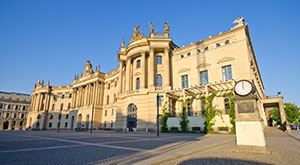Academic and Postdoctoral Careers in Germany
Postdocs receive a high level of support in Germany, with universities and research institutions keen to attract international academics. Whether you decide to pursue a career in a German university, non-university research institute or within the private and industrial sector, there are excellent opportunities to gain top-level experience and further your postdoctoral career.
There are over 400 universities and other higher education institutions in Germany which attract a high number of talented international postdocs every year. A career in a German university is highly prized and represents the most popular route for postdocs and senior academics wishing to further their research. During the postdoc phase, scholars are expected to work towards a professorship while carrying out teaching and administrative roles in the university.
Postdocs applying for a position in the German higher education sector should be aware that jobs are generally temporary (3-6 years) and only a small proportion of non-professorial academic positions at universities are offered tenure. Despite this, postdoctoral academic training in a German university remains a popular choice among international PhD graduates. This path can also open doors to a wide range of prestigious careers in the non-university sector. Following completion of a PhD, more than 50% of Germany’s research and development specialists work in universities, which represent a significant proportion of postdoctoral career opportunities.
The German academic system comprises opportunities for postdocs to work on their research while carrying out tutorial and clerical roles, including:
- Research Assistant: A postdoc who works on their own research project while also carrying out teaching and administrative tasks in the university. You will be responsible for teaching seminars and helping with undergraduate examinations while pursuing your research within the postdoctoral phase.
- Research Associate/Research Fellowship: Research associates and fellowship scholars usually work in a small university-based groups which are funded through a third-party organisation. These fellowships are intended to help early career researchers to conduct a defined project at a location of their choice. The work focuses on the research project being funded but there may be some teaching and administrative duties as well. Research fellowships are available to postdocs, senior researchers and academics through organisations such as the Alexander von Humboldt Foundation or the DFG. For more information about postdoctoral funding in Germany, visit our funding page.
- Junior Professorship: An alternative to the traditional habilitation route to a professorship in German universities (whereby postdocs carry out research training and teaching practice, leading to a professorship). A junior professorship in Germany enables young researchers to engage in research and teaching early on in their careers. The requirements for a junior professorship are usually an outstanding doctorate and a particular, individual approach to a research field. Junior professorships allow postdocs to bypass traditional routes to professorships, however these appointments are rare and available only to the most outstanding doctoral scholars.
Senior academic positions:
- Research group leader: If you are a researcher with several years’ experience you can apply to become a research group leader. German universities often collaborate with non-university organisations to establish junior research groups with funding support from third-party organisations. To secure a post as a research group leader you will need to demonstrate your ability to manage staff and large budgets as well as show that you can guide your research group project to successful completion.
- Professorships: To secure a professorship at a German university, candidates would need to have an excellent doctorate, extensive proof of teaching experience and academic achievements (such as work experience as a junior professor and/or junior research group leader) as well as a large body of published work. The appointments procedure for a professorship in Germany is rigorous and the university would usually form a committee in order to select the best candidate. Find out more about the path to a professorship in Germany, including information about salaries.
Max Saved Jobs Reached
A maximum of 500 Saved Jobs can be created against your account. Please remove an existing Saved Job in order to add a new Saved Job.
Manage Saved Jobs









